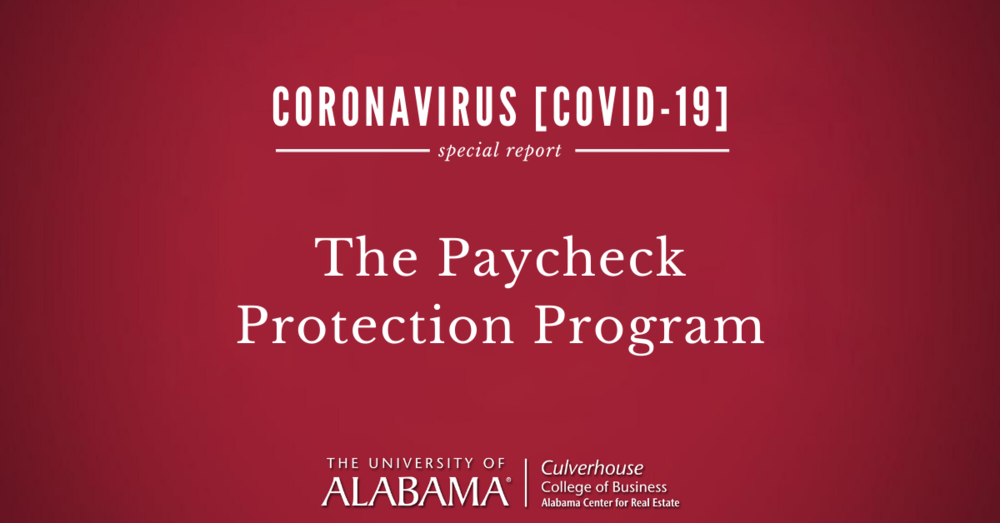If your company is facing outstanding expenses as a result of COVID-19, assistance is available through the Payroll Protection Program (the “PPP”) recently passed by Congress and signed into law by President Trump. The PPP is part of the Coronavirus Aid, Relief, and Economic Security Act (“CARES Act”) which, among other things, expands the existing SBA 7(a) loan program in order to provide eligible small businesses, sole proprietorships, independent contractors and self-employed individuals with access to loan proceeds as a way to keep employees on the payroll and to pay other company expenses in order to get through the COVID-19 crisis.
Time is of the essence as applications for PPP loan proceeds were scheduled to be accepted April 3, 2020 for small businesses and sole proprietorships before April 10, 2020 for individual proprietors, independent contractors and self-employed individuals.
INFORMATION NEEDED TO COMPLETE THE PPP APPLICATION
- Legal name of the business and its primary address
- Tax identification number/Social Security number
- Phone Number
- Email Address
- Average Monthly Payroll Amount: Note that in calculating the Average Monthly Payroll Amount, applicants should use the average monthly payroll for 2019, excluding costs over $100,000, on an annualized basis for each employee along with amounts contributed for items such as health insurance, profit sharing and unemployment.
- Number of Employees
- A list of all owners owning 20% or more of the business (a “20% Owner”), including the owner’s:
- name,
- title,
- ownership percentage,
- tax identification number or social security number and (v) address.
SUPPORTING INFORMATION NEEDED
The contact information for your existing lender so that we can immediately contact such an individual and transmit the required application and information needed to apply for the PPP loan.
Additional information to transmit to the Lender for underwriting consideration. This information will vary for different lenders but will include documentation such as:
1. The Company’s average monthly payroll costs for 2019 including the amount of wages, the amount invoiced for health insurance, company profit sharing contribution and state unemployment taxes.
2. The Company’s most recent tax return.
3. Documentation confirming the number of Company employees during 2019.
4. Documentation confirming the Company’s payroll costs for the next 8 weeks.
5. Documentation estimating the utility payments for the next 8 weeks.
6. Documentation showing your lease or mortgage payments for the next 8 weeks.
7. Documentation showing your health insurance premium payments for the next 8 weeks.
CONSIDERATIONS FOR APPROVAL OF THE LOAN BY LENDER
The good news is the process is being streamlined by the SBA and the only two factors to be considered by a lender in evaluating a prospective borrower’s eligibility for a covered loan are whether the prospect
- was in operation as of February 15, 2020, and
- had employees for whom it paid salaries and payroll taxes, or paid independent contractors, or qualifies as a sole proprietor, independent contractor or self-employed individual. The Lender will still need the additional information set out above to confirm the amount of the Loan.
BUSINESSES ELIGIBLE FOR A PPP LOAN
Businesses and qualified 501(c)(3) nonprofits with not more than 500 employees worldwide, or the applicable size standard for the industry as provided by the SBA, if that number is higher.
A business in the food-service or accommodation industry that has more than one physical location may still be eligible if it employs no more than 500 employees per physical location and is below a gross annual receipts threshold for its industry.
Sole-proprietors, independent contractors, and other self-employed individuals.
LOAN AMOUNT AND TERMS UNDER A PPP LOAN
The maximum loan amount is $10 million with the loan amount for each business determined by a formula tied to payroll costs incurred by the business (generally, 2.5 times the average total monthly payments for payroll costs during the prior year). The payroll costs include costs other than just salaries and commissions.
Interest is expected to be 1 percent, but in no event shall it exceed 4 percent, and no payment will be owed for 6 months following the Loan date.
The PPP does NOT require the traditional collateral or personal guarantees.
USE OF LOAN PROCEEDS BY YOUR COMPANY
Loan proceeds under the PPP allow the money to be used for expenses such as payroll support, insurance premiums, qualified mortgage payments (interest but not principal), rent and utility payments.
FORGIVENESS OF LOAN PROCEEDS UNDER THE PPP
The PPP includes a loan forgiveness provision, up to the amount of the loan, where a borrower will be eligible for loan forgiveness (including interest on the amount forgiven) equal to the amount spent by the borrower during the covered period (which is defined as the 8 week period following the date of the Loan) for
- payroll costs,
- (ii) interest payment on any mortgage beginning on the date of the Loan,
- payment of rent on any lease beginning on the date of the Loan, and
- payment on any utility beginning on the date of the Loan.
Borrowers will not be required to include the canceled indebtedness in their taxable income.
WHAT FEE WILL BE CHARGED TO OBTAIN THIS LOAN UNDER THE PPP?
You, as the borrower, will not be charged a fee for submitting an application and obtaining a loan under the PPP. The CARES Act provides for a fee to be charged by the lender and that this fee will be paid directly by the SBA. The CARES Act further provides that any agent (attorney or accountant) assisting you in filing the application with the lender is paid by the lender as part of the compensation received from the SBA.
This is a challenging time for many of us and we want to assure you that we are here to assist. Please do not hesitate to reach out to us.
_________________________________
Jack Kubisyn is a member of ACRE’s Leadership Council.
ABOUT CHRISTIAN & SMALL LLP
Christian & Small LLP represents a diverse clientele throughout Alabama, the Southeast and the nation with clients ranging from individuals and closely-held businesses to Fortune 500 corporations. By matching highly experienced lawyers with specific client needs, Christian & Small develops innovative, effective and efficient solutions for clients. With offices in Birmingham, metro-Jackson, Mississippi, and the Alabama Gulf Coast, Christian & Small focuses on the areas of litigation and business, is a member of the International Society of Primerus Law Firms, and is the only Alabama-based member firm in the Leadership Council on Legal Diversity. Our corporate social responsibility program is focused on education, and diversity is one of Christian & Small’s core values. Please visit www.csattorneys.com for more information.
No representation is made that the quality of legal services to be performed is greater than the quality of legal services performed by other lawyers.





